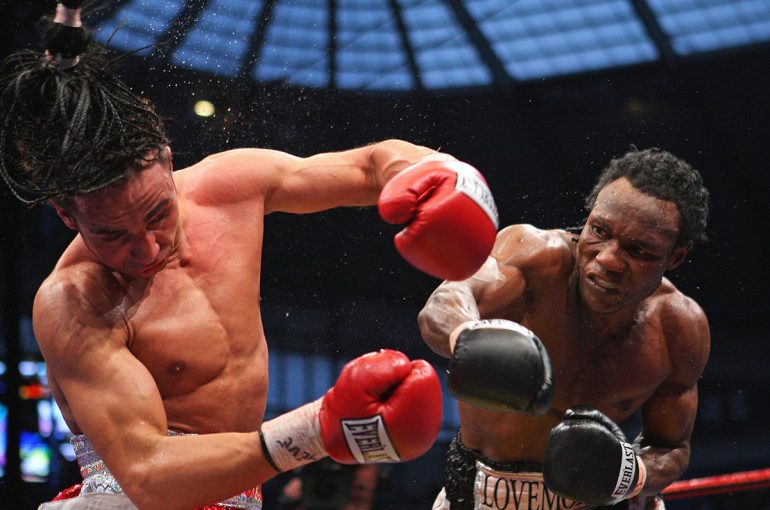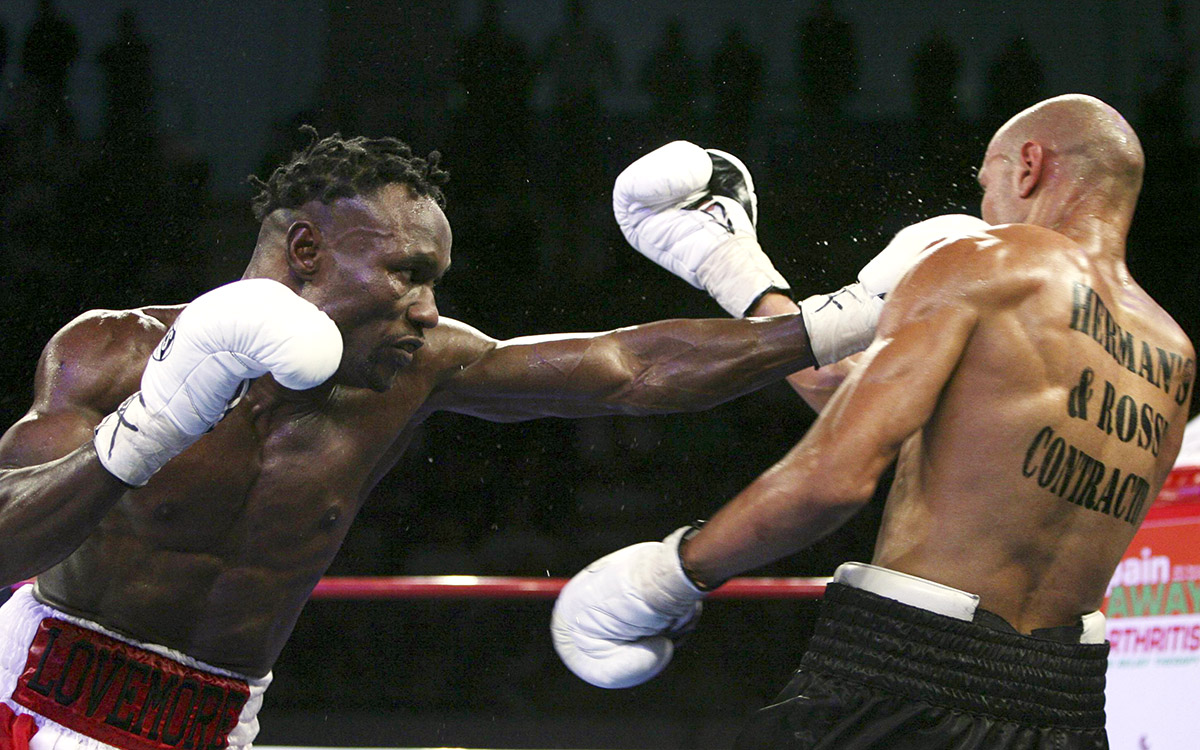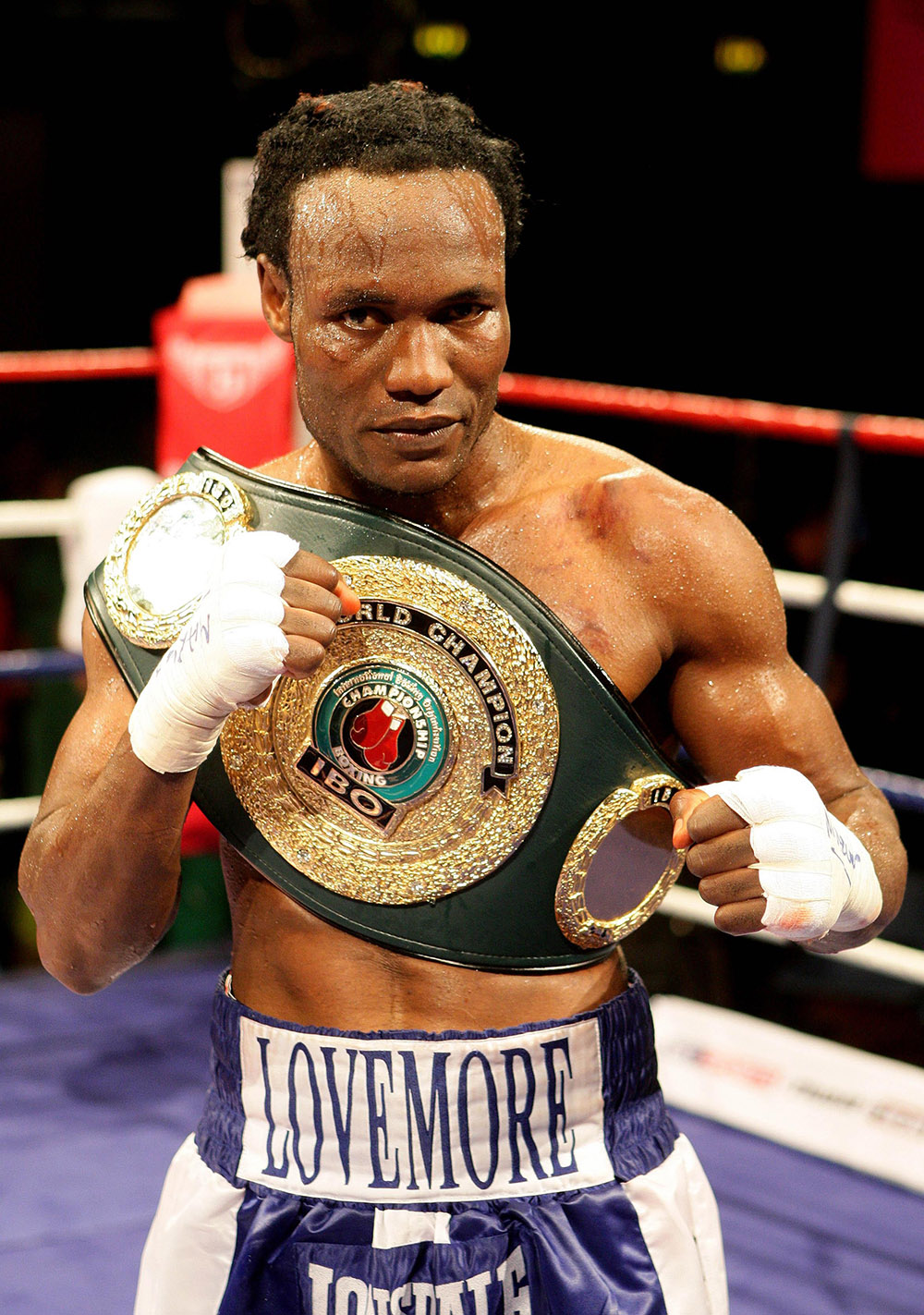Best I Faced: Lovemore Ndou

After overcoming abject poverty and Apartheid, Lovemore Ndou fought some of the best fighters of his generation and became a world champion.
Ndou, who was one of seven children, was born in Musina, Limpopo province, South Africa, on August 16, 1971. His early years growing up on the South Africa-Zimbabwe border were fraught with danger.
“I come from a very poor family, to an extent that sometimes a day or two would go by without a meal or just one meal a day,” Ndou told The Ring. “When I was 7 years of age, I had to swim across a crocodile-infested river to catch fish so I could feed the family. It was a responsibility that came with being the first boy in the family.”
His parents did their best to support the family; his father was a mechanic at the Defense Force, while his mother sold fruit and vegetables at the market. A lack of money meant Ndou didn’t start school until he was 9 and then had to work a job to pay the school fees and for the uniform.
“I grew up in South Africa during the Apartheid era, during a political turmoil, so I witnessed a lot of atrocities committed against my family members and friends,” he recalled. “When I was 13 years of age, my friend who was 12 years at the time got shot by the police during a protest and he died in my arms.
“When I was 16 years of age, I was incarcerated on trumped-up charges only because a white girl took a liking [to] me at a time when mixed relations were prohibited. The police beat me up so bad they chipped my front tooth, broke my left arm and set a dog on me. The dog almost bit off my right eye. People often see the scar on my face and think it’s from boxing. No, this was from a dog bite.”
“I thought I needed to be angry to fight better, but I was wrong.”
Ndou felt sports were his ticket out of poverty and Apartheid and tried soccer before arriving at boxing.
“I always knew and felt that sports were going to open up doors and opportunities for me,” he said. “So, basically, I tried all types of sports. I was really good at soccer, but I had major anger issues and didn’t last long on the field as a result. I would often knock out opponents if they played rough against me and get sent off the field. I got red-carded so mandouny times, they used to call me ‘Mr. Red.’ It was not uncommon to see me chasing after another player so I could kick him in the shin [rather] than chase the ball. I’m not proud of it, but that is how I was back then.
“I was angry about many things, including the political turmoil at the time. I was angry at being poor. I grew up in a bad environment and I was exposed to so many bad things as a child.”
One day, Ndou was playing against a local school when an overzealous opponent attempted to rough him up.
“So, I turned around and knocked him out cold,” he said. “They had to carry him off on a stretcher. They also had to get a security guard to escort me off the field. I recall when he was walking me off of the field, he said to me, ‘Kid, I don’t think soccer is for you. I have watched you so many times and you don’t seem to last long in the field. I think you should try out boxing.’
“He invited me to a boxing gym. It turned out he was a boxing coach and boxer himself. So, I went to the boxing gym the next day and that’s how my boxing career started.”

Ndou dropped a decision loss to Sharmba Mitchell in 2004. (Photo by Ed Mulholland/WireImage)
Firstly, his new coach set about working on controlling Ndou’s anger.
“I thought I needed to be angry to fight better, but I was wrong,” he explained. “I had to learn the hard way. So, he let me spar bigger boys, and they were whooping me so bad I had to learn to control my anger. The coach kept telling me, ‘Stay calm and you will see the difference.’ Eventually I realized that each time I was calm, I was thinking better and performing better.
“This did not only help or improve my boxing career, but it also changed me as a person. It changed me into this calm and collected person I am today. So, I am very grateful to boxing. I believe if it wasn’t for boxing, I would probably be dead or locked up in jail today. Growing up in South Africa at a time when almost every teenager walked around with a knife or gun, my life was doomed to fail, but [I give] all thanks to boxing.”
Ndou enjoyed a successful amateur career domestically, winning four national titles and going 66-2. However, he was unable to compete internationally at that time due to Apartheid.
Ndou turned professional in 1993 and went 10-1 before a life-changing opportunity came his way.

Ndou defeatead Naoufel Ben Rabah in 2007 to win the IBF junior welterweight title. (Photo by Fairfax Media via Getty Images)
“I came to Australia in 1995 just for one fight,” he explained. (The opponent was Cliff Sarmardin, to whom Ndou lost an eight-round decision.) “I fought on the undercard of Kostya Tszyu vs. Roger Mayweather. I fell in love with the country right away, more because of the reception I received from the Aussies. They treated me like a human being, something which I was not accustomed to back in South Africa. They did not see a black man in me but a human being. The following year, I moved to Australia permanently.”
Over the next five years, Ndou reeled off 20 wins with one defeat in his new home. In 2002, Ndou was offered the chance to further his career in the U.S. but went 1-2 and returned to Australia.
Several wins followed before Ndou met American contender Sharmba Mitchell for the interim IBF 140-pound title in February 2004. Although Ndou didn’t win, he put forth a solid effort in losing a 12-round unanimous decision.
Later that year, “The Black Panther” met rising superstar Miguel Cotto.
“I took the Cotto fight on a week’s notice,” revealed Ndou, who lost a hard-fought 12-round unanimous decision. “I gave it my best. There was already talk about Cotto becoming the next big thing in boxing at the time, and he did just that.”
Less than a year later, Ndou met Junior Witter in a WBC world title eliminator in Los Angeles on the undercard of Bernard Hopkins’ middleweight title defense against Howard Eastman.
“My recollection of the fight is that it was on and off – we couldn’t agree on a lot of things, including the purse,” he said. “I was already on my way to the airport to fly back home when the deal was finally struck, only two days [away from] the fight. So, mentally I was not ready for the fight. This is not to discredit Witter. He fought a great fight and he was the better boxer on the day.”

NDou, here after a draw against Matthew Hatton in 2009, moved up to welterweight in the closing years of his career. (Photo by Dave Thompson/PA Images via Getty Images)
Ndou rebounded with five wins in Australia and was then matched with Naoufel Ben Rabeh as a final eliminator to face newly minted IBF junior welterweight titleholder Ricky Hatton. When Hatton decided to pursue a megafight with Jose Luis Castillo instead, Ndou found himself facing Ben Rabeh for the title.
A close fight ensued. Both men had their moments, but it was Ndou who closed stronger, forcing Ben Rabeh to retire before the start of the 11th round. Despite that title triumph, Ndou is rather philosophical about the achievement.
“Winning a world title is every fighter’s dream,” he said. “So, it was the best thing for me at the time. However, over the years I have learned to realize that winning a world title only gives you status, money – if you are lucky and well-managed – and sometimes brain damage. I value education over boxing titles. No one is ever going to take my university degrees from me and the knowledge that comes with it. They remain mine until I die.”
Ndou lost his title in his first defense against Paulie Malignaggi (UD 12). However, 11 months later, they met a second time on the undercard of Ricky Hatton’s homecoming against Juan Lazcano in Manchester, England, and Ndou gave the American a much tougher time, narrowly losing a 12-round split decision.
He decided to step up to welterweight and lost a competitive decision to the naturally bigger Kermit Cintron (UD 12) in an IBF title eliminator.
Ndou returned to South Africa and bested compatriot Philip Ndou (no relation) at welterweight by 12-round unanimous decision. He then returned to England and fought Matthew Hatton to a 12-round draw.
Next came a fight with burgeoning superstar Canelo Alvarez. The fight was out of Ndou’s natural weight class and he was nearly double the Mexican’s age, but the savvy veteran found a way to hang tough for 12 rounds.
“There was already talk about Canelo becoming the next big thing in boxing at the time I fought him, and he was just that,” he recalled. “It was great fighting in Mexico. I love Mexican people, their food and culture.”
In the penultimate fight of his career, Ndou traveled to Sheffield, England, to face future IBF welterweight titlist Kell Brook in June 2011.
“It was a great fight,” said Ndou, who dropped a wide 12-round unanimous decision. “I was at the end of my boxing career. Brook fought like a warrior.”
In his final fight, Ndou bested former IBF 130-pound titleholder Gairy St. Clair before retiring with a record of 49-13-2 (31 knockouts). The iron-jawed fighter was never stopped in 64 professional fights.
Ndou, now 52, lives in Sydney, Australia, where he is a lawyer. He has three children and two grandchildren.
“I hold degrees in various disciplines, including law, communications, human rights and politics,” he said. “They call me the brainiest boxer for a reason. I hold seven university degrees and I am currently working on my doctorate. I am currently the principal attorney at Lovemore Lawyers.”
He also has a book called Tough Love: The Amazing True Story of a Boxing World Champion turned Lawyer.
He graciously took time to speak to The Ring about the best he fought in 10 key categories.
BEST JAB
Paulie Malignaggi: “I would have to pick Paulie Malignaggi. He was very slick with his jab.”
BEST DEFENSE
Junior Witter: “He was very elusive with a very unusual fighting style.”
BEST HAND SPEED
Canelo Alvarez: “It seems he keeps improving with every fight. He is also a great counterpuncher.”
BEST FOOTWORK
Alvarez: “He moves very well in the ring, and that’s what makes him so dangerous.”
SMARTEST
Alvarez: “I found Canelo Alvarez and Miguel Cotto very smart in the ring. Canelo slightly edges it.”
STRONGEST
Miguel Cotto: “I would have to go with Miguel Cotto. I would also say Alvarez, but when I fought Alvarez, I was just a little guy coming up against a big fighter. The fight was at junior middleweight, but I was only a junior welterweight that went up in weight to fight him because the purse was good. Cotto, on the other hand, was a legit junior welterweight when I fought him but strong as a bull.”
BEST PUNCHER
Jose Luis Juarez: “He is the first boxer to ever drop me fairly. I recall getting up and referee Marty Denkin was on the seven count. It was towards the end of Round 9, and when I got up, I held onto him like I was going to fornicate with him until the bell went.”
BEST CHIN
Daomai Sithkodom: “A Thai fighter I fought in Australia. I hit him with everything I had, but he wouldn’t go down.”
BEST BOXING SKILLS
Canelo: “Canelo and Cotto are the best-skilled fighters I have fought. Canelo slightly edges this one. His record and achievements in boxing speak for themselves.”
BEST OVERALL
Canelo/Cotto: “I’m sorry, I cannot pick one. I would have to go with Canelo and Cotto. It’s a tie. Both of them are great fighters I have immense respect for, with exceptional skills. They both could box and brawl, which made them the best overall. I can only judge their greatness by their performance against each other, but not by how they performed against me. Alvarez beat Cotto in one of the most beguiling spectacles: two boxers with equal measures of class and artistry. You make your own judgment.”
Questions and/or comments can be sent to Anson at [email protected].















